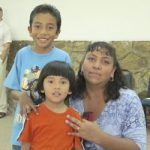
“Be somebody.”
My grampa used to tell me if I saw something that needed doing to “be somebody” and do it myself.
I wasn’t really shocked when Grampa yelled “be somebody” in my head that late December night in 2006. For some reason I had woken up at 3:00 AM to a report about the savage winter they were having in the Copper Canyon area in northern Mexico. Two Tarahumara girls were standing in snow almost to their knees, with their colorful skirts pooled around them, being interviewed about why they were out in the cold. They were on their way to school, which was close by, according to them, only a two-hour walk each way. The girls wanted to get an education and help their people. When they turned and walked away I realized they were barefoot. Somebody needed to do something. That’s when Grampa yelled at me to be somebody.
Seeing these girls really touched my heart and struck a chord with me. You see, when my grampa was in his senior year of high school they were having a very bad winter in Montana, where he lived. The ranch was too far for him to ride to school through the snow, so he lived under a bridge that Montana winter so he could get an education. When graduation time was coming around the teacher let him know that he wouldn’t be able to walk in the ceremony: he didn’t have shoes. It was the Depression, he was one of twelve children, there wasn’t any money for shoes. On graduation day when he went down to breakfast there was a new pair of shoes sitting on his chair. No one said anything when asked where they came from except the bride of one of his older brothers had been brought home a few days earlier. She told him somebody had left the shoes their for him. Grampa noticed that her long, red hair that he had so admired a few days before was now cut in a fashionable short bob. He suspected she bought them for him, but she never admitted it.
I didn’t have a choice, I had to be the somebody. The next day I started making calls to get help for the Tarahumara, and got nowhere. For days I was met with indifference, bigotry, and ignorance. Many times I heard, “They should move somewhere else” and “Who cares? They’re just a bunch of Indians.” I was very disheartened and was on the verge of giving up. Yet again I was crying in the office from frustration. I asked for a clear sign if I was supposed to keep trying, or give up, and went back to work. A musician came in to take out an ad for a gig he was playing. He asked why I was upset and I told him what was going on. He invited me to come to his gig and make a plea to the public. I thanked him and said I would think about it. As he was leaving he paused in the doorway, turned to me, and said, “By the way, I’m Montana.” There was the sign, like a 2×4 plank between the eyes.
I went to the gig, pleaded for help, and the public gave generously, everyone except one woman. She raked me over the coals. She was waiting for me the next day when I got to work. She had filled her whole car with blankets, warm clothes, school supplies, food, and even candles. People came in for days with donations. I was overwhelmed. My mother spent days on the couch surrounded by mounds of socks, matching and rolling them, while a couple of friends helped sort everything else. This is how the Tarahumara Project was born.
The generosity of people has helped keep the free Tarahumara clinic open, where thousands of people, mostly children, have been treated for pneumonia, gastroenteritis, tuberculosis and other diseases. Mothers no longer have to choose between taking a sick child to the hospital and staying at home to take care of the other children. We were able to have hand mills installed so the women could grind their own corn and feed all their children. Help was provided to retrofit special panels on the walls of the X-ray room so the government wouldn’t close them down. Wells have been drilled and water collection systems have been installed. Thousands of pieces of warm clothing and blankets have been distributed. It’s only a drop in the bucket really, considering there are anywhere from 80,000 to 120,000 Tarahumara in the Sierra Tarahumara, depending on how the government counted. One time we were able to buy enough oats, sugar and oil to provide a whole winter’s worth of meals to more than 500 children and their siblings that were failing to thrive. And then there is the school that teaches the children in their own language and then Spanish. They are taught to be proud of their heritage, who they are, and where they come from. They are taught skills to survive in the outside world, but also are shown that it is fine to keep the old ways and be traditional.
These trips aren’t easy. Most years since the first trip I have gone twice a year. It’s over 900 miles each way. The roads take me through some very dangerous areas, and, yes, there have been encounters over the years that frankly have taken years off my life. The cartels are very active up there, and recently two priests I had met on one of the first trips I made were gunned down in their own church while giving last rites to a tour guide who had been shot and had run into the church looking for safety. The good, however, outweighs the risk. To know that there is a person who will sleep warmer tonight or be able to get an education or health care when needed makes it all worthwhile. It gives me purpose. I am so thankful to be the conduit of the goodwill and generosity of the people here. Without them, you, I couldn’t “be somebody.”
If you would like to “be somebody,” come to the fundraiser at La Bodega in Ajijic Sunday, October 16, from 12:30 to 5:00 PM. The restaurant will be donating a percentage of meals to the cause, and we will be collecting blankets, warm clothing, school supplies, and cash. All proceeds from the sale of a small collection of Tarahumara goods, clothing and jewelry from gypsies, the store owned by Libby Townsend and Heather Altmire, donated jewelry and artwork will also go to the Tarahumara. Judy King will be on hand with her collection of Halloween and Day of the Dead jewelry, and Jill Steimle from Sol Mexicano will be donating proceeds from The Oilcloth Queens line of bags, placemats, tablecloths, and other lovelies.
- Tarahumara Project - September 30, 2022








